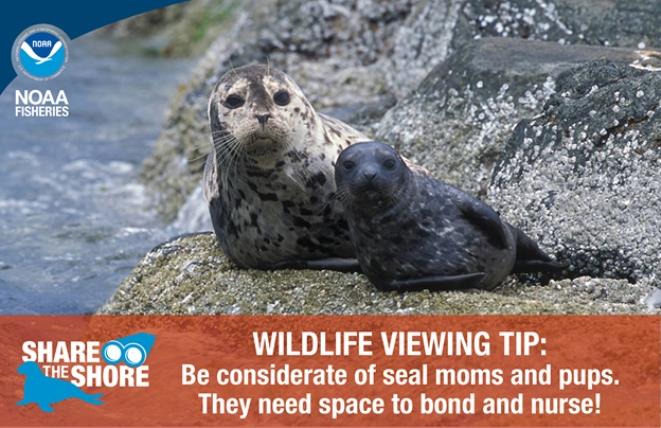
Seal pupping season calls for safe wildlife viewing
by NOAA Fisheries 4 Jan 2018 14:51 PST

Wildlife viewing tip © NOAA Fisheries
Harbor seal pupping season began last week in southern California, giving wildlife watchers a unique chance to watch seals give birth and care for their young at haul-out sites such as Children's Pool and South Casa Beaches in La Jolla.
Children's Pool gives visitors on walkways and viewing platforms the chance to see a harbour seal colony up close. Onlookers should use caution, however, and safely observe harbour seals, California sea lions, and other marine mammals from a distance by adhering to NOAA Fisheries' Share the Shore guidelines.
Safe wildlife viewing is especially important during pupping season for harbour seals, which runs roughly from December to May in southern California and then gradually extends north up the West Coast, reaching the coast of Washington in the summer. Pups have fragile bonds with their mothers for the first four to six weeks of their lives. Frightening or flushing mother seals into the ocean may lead them to abandon their pups, which may starve and die.
"The abandonment of a baby harbour seal during pupping season is often a no-win situation," said Justin Viezbicke, NOAA Fisheries Stranding Coordinator for California. "We may not be able to rescue an injured or abandoned animal surrounded by others without disturbing the rest of the animals causing additional abandonments. It's a really challenging situation."
Not all seal pups alone on a beach are abandoned. Mothers may leave newborns in search of food, often returning many hours or even days later. Only an expert from NOAA Fisheries or another organization that is part of the West Coast Marine Mammal Stranding Network, such as SeaWorld Rescue, can determine if a pup's mother has abandoned it. Only these authorized personnel may touch or handle a marine mammal.
"We typically wait 24 to 48 hours to determine if a pup has been abandoned," said Viezbicke. "Even then it may not be obvious, since the mother could be foraging during the day and feeding the pup at night."
If you spot what you think is an abandoned or sick marine mammal, call our hotline at 1-866-767-6114.
In general, for safely viewing harbour seals:
- Keep your distance. You're too close if an animal starts to stare, fidget, or flee.
- Seals on land are especially wary and may abandon their pups by rushing into the water, threatening the pups' survival.
- Keep pets away and on a leash. Pets can disturb or harm wildlife or separate mothers from their pups.
No matter where you see marine mammals and other sea life, be sure to use proper beach or ocean etiquette. The wildlife will thank you.
For more information see: Safe viewing of marine mammals, including printable "Share the Shore" flyers in English, Spanish, and Chinese